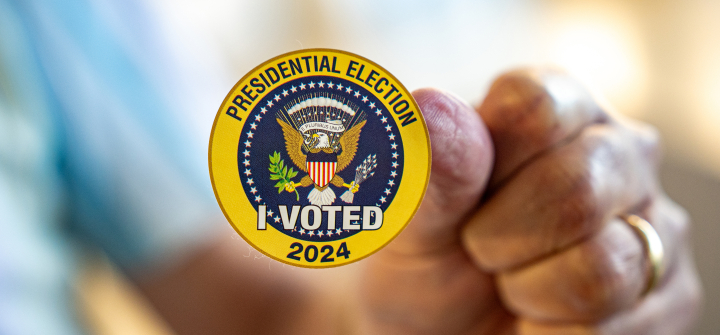The 2024 U.S. Elections: An Existential Crossroads for Global Health Policy
The 2024 U.S. elections will shape the future of global health policy, determining whether the nation will continue to provide crucial leadership to advance global health. Yet, with only passing mention of the field’s challenges in the presidential debate, the global health community must raise awareness of the global health positions of U.S. political candidates.
The U.S. has long played a leading role in global health governance and was central to the 1948 establishment of the WHO, hosting the International Health Conference that adopted the WHO Constitution. The U.S. offered critical support to WHO policies and programs to build a healthier world out of the ashes of World War II, leading collaborative efforts to advance the International Health Regulations, frame primary health care systems, and eradicate smallpox.
Through the years, global health received bipartisan support in U.S. foreign policy. As the largest donor for global health, foreign health assistance has become an extension of American values and an anchor of U.S. “soft power”—enhancing U.S. leadership in the world through USAID, the U.S. Public Health Service, the NIH, the CDC, and other government agencies advancing global health.
Faced with the challenge of the HIV/AIDS pandemic, the U.S. worked with other nations to create the Global Fund to Fight AIDS, Tuberculosis and Malaria in 2001, and launched unprecedented ongoing assistance for HIV treatment through PEPFAR in 2003. U.S. funding and international leadership have become central to global efforts to prevent disease and promote health. For example, the U.S. marshaled nations in 2014 to establish the Global Health Security Agenda, which supports country-led efforts to prevent, detect, and respond to public health emergencies.
However, the politicalization of U.S. leadership in global health has threatened global governance and divided political parties on policies to promote public health throughout the world. The 2016 election led to a dramatic retreat in America’s engagement in global health: The Trump Administration prohibited foreign assistance for reproductive health services, withdrew from the Paris Climate Agreement, and pursued populist foreign policies that neglected public health, restricted human rights, and abandoned global governance.
These decisions proved damaging in the COVID-19 pandemic. The Trump Administration quickly politicized the pandemic, as political officials interfered in public health decision-making at home and undermined global governance in the pandemic response. As the world came together to address a common health threat, the Trump Administration halted funding for WHO and then sought to withdraw from the organization entirely.
These decisions became influential in the 2020 presidential election, and the Biden Administration moved quickly to restore U.S. leadership in global health—reaffirming commitments to WHO governance and the Paris Agreement, joining global efforts to distribute COVID-19 vaccines, promoting environmental health under the Inflation Reduction Act, and leading international efforts to revise the International Health Regulations to prepare for future pandemic threats.
The 2024 U.S. elections will be pivotal in determining whether this engagement continues—or if the nation reverts to isolationist approaches to global challenges. The elections present a clear contrast in global health visions across America’s political parties, with crucial impacts on the policies that structure global governance, health financing, sexual and reproductive health, corporate regulations, tax equity, humanitarian challenges, and climate change.
The future of the nation’s leadership in global health hangs in the balance of this election, raising an imperative for candidates to highlight their global health positions. Given the wide-ranging implications facing a divided electorate, global health stakeholders must raise awareness of these positions for voters—in local, state, congressional, and presidential decisions—with this election engagement laying a foundation for the next generation of U.S. global health leaders.
Benjamin Mason Meier, JD, LLM, PhD, is a Professor of Global Health Policy at the University of North Carolina at Chapel Hill.
Neha Saggi is a Health Policy and Management student at the Gillings School of Global Public Health at the University of North Carolina at Chapel Hill.
Muhammad Jawad Noon, MBBS, MSc, is a medical doctor and public health student at the Harvard T.H. Chan School of Public Health.
Xinshu She, MD, MPH, FAAP, is a Clinical Associate Professor at the Stanford University School of Medicine.
The authors are members of the Advocacy and Communications Committee of the Consortium of Universities for Global Health (CUGH).
Join the 50,000+ subscribers in 170+ countries who rely on Global Health NOW summaries and exclusive articles for the latest public health news. Sign up for our free weekday newsletter, and please share with friends and colleagues.
A man holds up a sticker that reads "Presidential Election I Voted 2024" on the first day of Virginia's in-person early voting at Long Bridge Park Aquatics and Fitness Center on September 20, 2024, in Arlington, Virginia. Andrew Harnik/Getty








